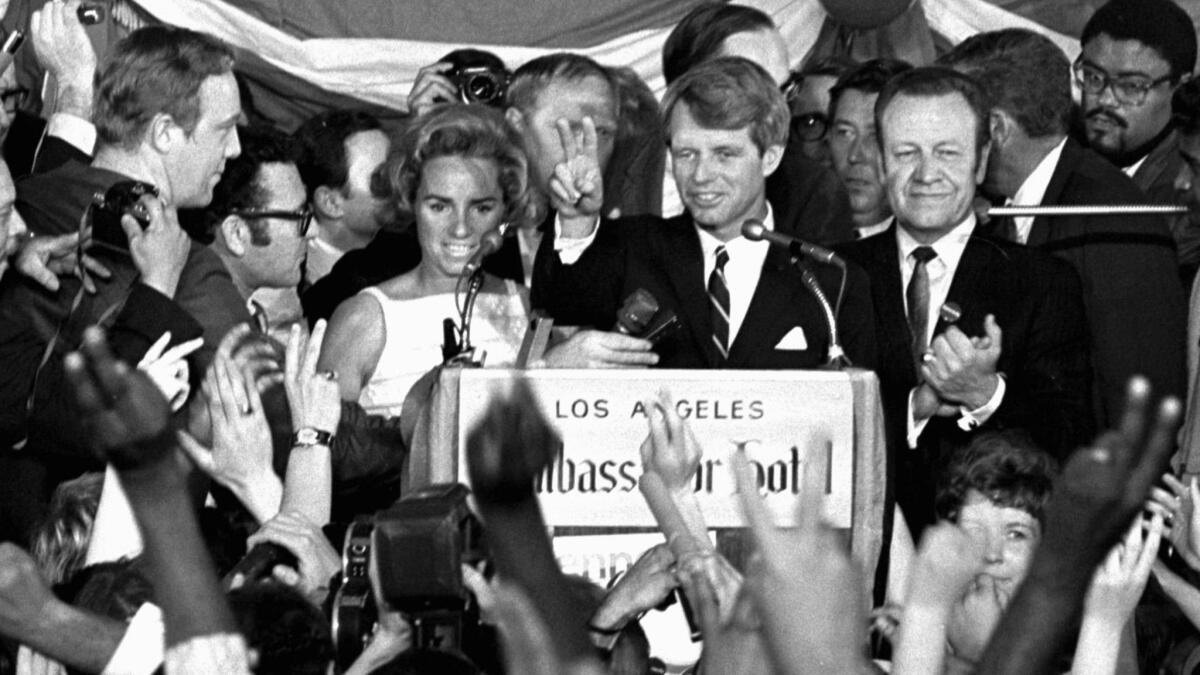Capitol Journal: How Robert F. Kennedy’s assassination altered California politics

- Share via
Reporting from Sacramento — It was one of those horrific events — everyone remembers where they were, if they were anywhere.
Fifty years ago, I was sitting at a typewriter and writing the lead story for the next morning’s Sacramento Union, Mark Twain’s old newspaper that, like so many print dailies, no longer exists.
My first paragraph began: “U.S. Sen. Robert F. Kennedy kept his presidential hopes alive Tuesday by winning the California primary….”
Then the TV sets and clackity wire service machines began blaring the shocking, depressing news that Kennedy had been shot moments after declaring victory in front of cheering supporters at the Ambassador Hotel in Los Angeles. “So my thanks to all of you,” he said in words still seared in memory, “and it’s on to Chicago and let’s win there” at the Democratic convention.
Kennedy was leaving through the kitchen when Sirhan Sirhan shot him with a .22-caliber revolver. The senator died 25 hours later on June 6.
RELATED: The assassination of Robert Kennedy, as told 50 years later »
The assassination altered California politics and American history. Experts differ about whether Kennedy would have beat out Vice President Hubert Humphrey for the Democratic presidential nomination and gone on to capture the White House over Republican Richard Nixon. I’ve always thought he would.
He had momentum after California. He also had youth, elegance, political skills, a revered family brand and a popular issue: ending the senseless Vietnam War.
It already was a tumultuous year, one of the most divisive in American history. Today the nation is polarized politically. But for most people — if you’re not an undocumented immigrant or a young black man fearing police injustice — grievances are largely abstract. In 1968, many more millions were directly feeling the tumult.
RELATED: A timeline of 1968, a year of anger, grief and change »
Kids were being drafted into an increasingly hated war. College campuses were torn by riots. Cities were burning in civil rights protests. “Hard hats” and hippies despised each other.
Recall this chain of events:
At the end of January, the North Vietnamese and Viet Cong launched their surprise Tet offensive. While not a military success, it inflicted heavy casualties on American troops. And it was a propaganda triumph because President Lyndon Johnson and his administration were shown to be lying to Americans about how the war was going. It sparked antiwar protests across the nation.
In March, Minnesota Sen. Eugene McCarthy — an outspoken and articulate opponent of the Vietnam War — ran close to Johnson in the New Hampshire primary. Four days later, Kennedy entered the race. And two weeks after that, Johnson stunned the nation by bailing in a nationally televised speech.
On April 4, the Rev. Martin Luther King Jr. was assassinated at a motel in Memphis, Tenn. Riots erupted across the country.
A month after Johnson bowed out, Humphrey announced his presidential candidacy. A late entry, he focused on non-primary states where party leaders controlled convention delegations.
McCarthy won early primaries, but Kennedy bounced back with victories in Indiana and Nebraska. Then McCarthy upset him in Oregon. That set up California as the pivotal primary on June 4.
This was an era when, unlike in recent years, California’s primary was a very big deal. It was a winner-take-all contest for delegates and could mean a candidate’s overall success or failure. There was heavy media coverage of parades and rallies. Families got into it.
In Sacramento, Kennedy packed a shopping mall. “I remember that rally like it was yesterday,” says my daughter, Karen, then 7.
“I remember mom holding my hand and telling me this was a really important person in our country who came all the way to Sacramento. It made me excited about politics. I also remember being told that Kennedy promised to build sidewalks a few blocks away. That was a big deal to me.”
Karen grew into a political junkie and became an advisor in the Clinton White House, where she presumably learned that presidents don’t build local sidewalks.
Kennedy wound up winning with 46% of the vote. McCarthy got 42%.
It was one of the biggest primary turnouts in history — 72.2% of registered voters. By comparison, the 2016 California presidential primary had a turnout of only 47.7%.
The Republican primary also was a game-changer. Moderate Sen. Thomas H. Kuchel, the Senate minority whip, was upset by a right-wing demagogue, state schools chief Max Rafferty. The GOP then coughed up the seat in November when Democrat Alan Cranston beat Rafferty and began a 24-year Senate career.
After the assassination, all the spirit left California’s delegation, particularly its leader, Assembly Speaker Jesse “Big Daddy” Unruh. He had long been “the Kennedys’ man” in California, and was with the senator when he was shot.
Coverage of California politics »
Unruh and his delegation went to Chicago and split into camps supporting McCarthy, Humphrey and Sen. George S. McGovern. Outside, it was a hellish skirmish between cops and antiwar protesters. The convention was about cracked heads, tear gas clouds and a Democratic debacle.
Afterward, Unruh became bitter and he brooded.
“Most of what I did that summer was sit around and cry and drink — and I didn’t cry much,” Unruh later recalled. He was so demoralized and Democrats were so discombobulated that Republicans wrested control of the Assembly, toppling Unruh from power.
And California joined the nation in electing native son Nixon president.
A lot has changed since 1968. California’s population has doubled. And Republicans have sunk into virtual irrelevance.
Yes, we’re polarized today. But compared to 1968, this is a Sunday picnic in the park.
Follow @LATimesSkelton on Twitter
More to Read
Get the L.A. Times Politics newsletter
Deeply reported insights into legislation, politics and policy from Sacramento, Washington and beyond. In your inbox three times per week.
You may occasionally receive promotional content from the Los Angeles Times.











